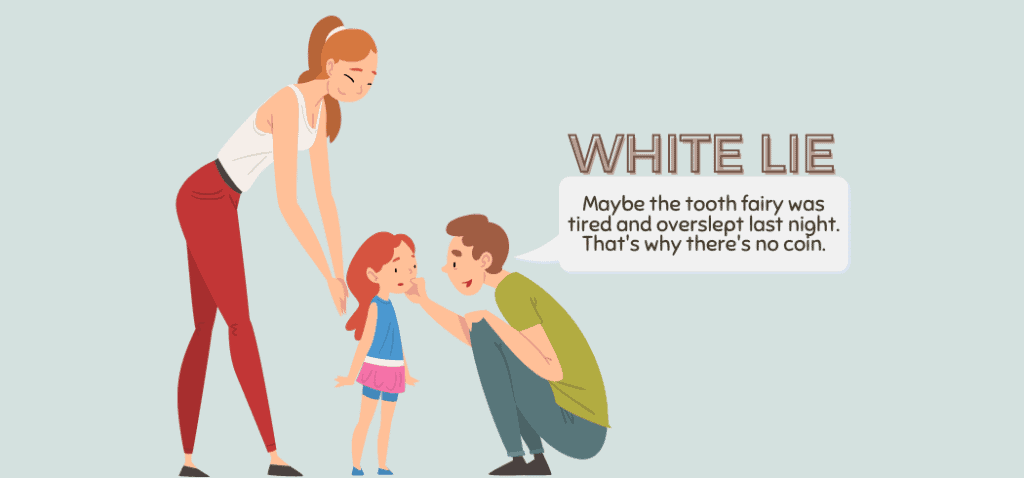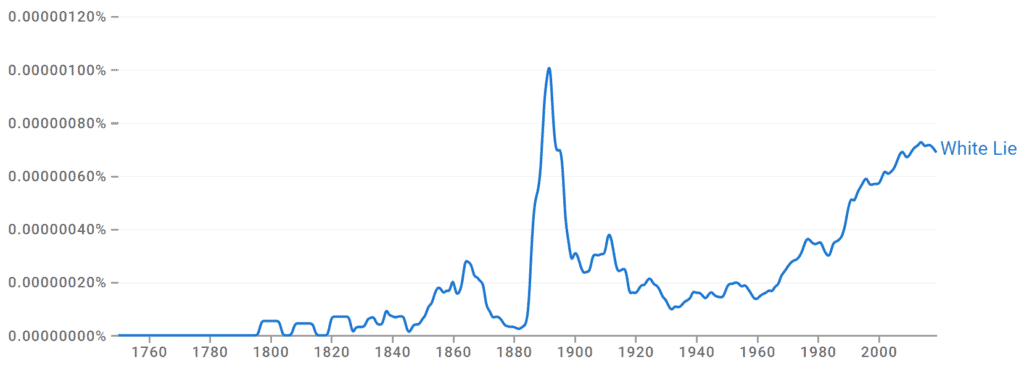Symbolic color contrasting has long been a part of human history, spanning back as long as human records have been found. Light symbolizes day, dark symbolizes night, and various objects associated with either of these have shown up in pictographs, glyphs, pottery, clothing, and even written references for tens of thousands of years.
But where do these concepts stem from? And, how do they relate to lies (how old are lies anyway?)? Let’s explore these concepts below through the exploration of what a “white lie” is and where it originates from.
What Is a White Lie?

A white lie is a fib that is told to spare the feelings of the listener, or so the teller may avoid minor repercussions. A white lie is considered harmless and sometimes may even be considered kindness when trying to avoid hurting a person’s feelings due to another person’s ill intent.
For example:
- I hated having to lie, white lie though it was, but I wasn’t about to repeat what he had said about her.
- Most people have told various white lies in their life to avoid conflict or spare another’s feelings.
- He felt compelled to tell her the smallest of white lies because he didn’t want to admit he hated that shade of red on her; she still looked lovely.
- Her white lies concerning semester grades were soon out of control since she never made the corrections her teacher required to raise them.
- They were embarrassed to admit that the white lies they had told about missing his performance were, in fact, lies after he found out they were at the movies instead.
It’s important to note that the concept of a white lie is not at all associated with racial or cultural differences (despite what some people might try and get you to believe). White has long been associated with daylight, goodness and safety, while black or dark colors have been associated with death, fear or a general sense of watchfulness.
These concepts are ancient, some of which stem from the very real fact that night brings danger. It is difficult to see at night, and many animals hunt by night, thus making humans more cautious and likely to close themselves indoors for protection.
Tens of thousands of years of this survival mentality have “colored” associations deeply embedded in the human psyche. It then led to a general relation of white with a sense of good, with black being its opposite (although not always associated with a sense of evil).
Origins of “White Lie”
This long metaphorical use of white vs. black is seen in all cultures worldwide and is a true archetype spanning time and space. In fact, one of the oldest surviving records of its documentation is seen in Ying and Yang symbols carved into animal bones carbon dated from the 14th century BC. Other recorded forms show up years later in written philosophies, one being from the 6th century BC in Pythagorean’s Table of Opposites.
The word lie, meaning to speak falsely or tell an untruth to mislead, is ancient and likely from the Proto-Germanic word leuganan, recorded as a spoken language as far back as 500 BC. This adapted into Old English as legan, ligan, and an earlier version, leogan, meaning to “deceive, belie, or betray.” In Middle English, it became lien.

One of the earliest uses of the term white lie was recorded in a 14th-century letter recorded in the Oxford English Dictionary.
- “I do assure you he is vnsusspected of any vntruithe or oder notable cryme (excepte a white lye) wiche is taken for a Small fawte in thes partes,”
In the 16th century, Sir Thomas More wrote he was “not so superstitiously veracious as to reckon every white lie as black as murder.”
The term never seemed to catch on to literary circles until the 18th century when The Gentleman’s Magazine published a gossip column using a definition of the term in 1741.
“…certain Lady of the highest Quality … makes a judicious Distinction between a white and a black Lie. A white Lie is That which is not intended to injure any Body in his Fortune, Interest, or Reputation but only to gratify a garrulous Disposition and the Itch of amusing People by telling Them wonderful Stories.”
Let’s Review
White lies are the combination of the symbolic use of the color white as good or pure, combined with the general telling of an untruth to deceive. The term is meant to convey a lie told as a way to spare the feelings of the audience or highlight a harmless lie that may not have any long-term repercussions.
Check out some other articles we covered:
